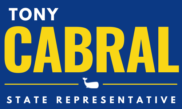CABRAL LEADS EFFORT TO MAKE REMOTE ACCESS PERMANENT
July 8, 2022
BOSTON, MA – As the House Chair of the Joint Committee on State Administration and Regulatory Oversight, State Representative Antonio F.D. Cabral (D-New Bedford) took to the rostrum during the House debate yesterday to argue the Legislature should fully embrace the positive benefits of remote access and modernize participation in public meetings to better meet the needs and expectations of the post-pandemic public.
In March 2020, in response to the COVID-19 pandemic, Governor Baker issued an Executive Order suspending certain provisions of the Open Meeting Law to enable public bodies to meet remotely and provide remote access to the public.
Cabral filed an amendment to H.4989, An Act relative to extending certain state of emergency accommodations, which would, starting on April 1, 2023, create a permanent hybrid model for access and participation in local, regional, county, and state public bodies, requiring both a physical meeting space and a mandatory remote access option.
“Over the past year, I’ve worked closely with the Attorney General’s Office and advocates to draft a solid proposal that will make permanent a silver lining of the ongoing pandemic: remote access and remote participation at meetings of public bodies,” said Rep. Cabral. “The ability to participate remotely has significantly increased participation in our democratic process throughout the Commonwealth. This proposal makes permanent the flexibility permitted during the Covid-19 State of Emergency while safeguarding transparency, convenience, and access by the public.”
Provisions in the underlying bill also extended and/or expanded on pandemic-era rules on remote notarization, eviction notice procedures, real estate property closures, and remote participation for town meetings. Temporary rules were extended through March 31, 2023, to prepare for an April 1, 2023, implementation date.
Rep. Cabral’s amendment was passed by a unanimous vote.
After the House’s vote, a group that includes the ACLU of Massachusetts, Common Cause Massachusetts, Disability Law Center, League of Women Voters of Massachusetts, Massachusetts Newspaper Publishers Association, MASSPIRG, New England First Amendment Coalition, Boston Center for Independent Living, and New England Newspaper & Press Association released the following statement:
“We applaud the legislature for consistently appreciating the importance of remote access to public meetings. We are deeply grateful to Chairman Cabral for his leadership in filing this amendment, and to Representative Garlick and Senator Lewis for filing the initial legislation to ensure hybrid access and participation in public meetings. Across the Commonwealth, remote access to public meetings has significantly increased public participation in state and local government, and has lowered longstanding barriers for people with disabilities, people with limited access to transportation, and people with work and family obligations. We urge the legislature to ensure that the final legislation includes a permanent requirement for hybrid public meetings.”
“I am proud of the work our committee has done to find a balance between the many stakeholders involved. I firmly believe there is no reason to move backwards from this new era of public access. Now that we have experienced the benefits of remote access to public meetings, we cannot go back,” said Rep. Cabral.
Modernizing Participation in Public Meetings, the amendment filed by Rep. Cabral would:
- Make hybrid meetings of public bodies a permanent fixture; all meetings of a public body will be physically open and remotely accessible to the public.
- Extend the COVID-19 Emergency Rules to March 31, 2023, and institute a new hybrid model on April 1, 2023.
- Require that all public bodies, including state bodies, provide for remote access (for the public) and remote participation (of the members) at every meeting.
- Require all public notices be posted to a website. Presently under the Open Meeting Law, the default notice posting location for public bodies is a physical notice location near the clerk’s office and posting the official notice to a website is optional. This section reverses this paradigm to make the website the default location for posting meeting notices and a physical posting becomes optional.
- Require that a public body shall have at least one-third physically present at the meeting location and members that are participating in the meeting through remote access may vote, count towards the quorum, and shall not be deemed absent. The Chair will not be required to be in-person.
- Require that members of a state public body shall have at least one of its members physically present at all meetings and members participating remotely may vote, count towards the quorum, and shall not be deemed absent.
- Require that remote access for the public shall include captioning through automatic speech recognition technology or other reasonable accommodations if needed, consistent with the American Disabilities Act and chapter 151B to persons with disabilities remotely accessing the meeting.
The bill now moves back to the Senate for their final consideration.
